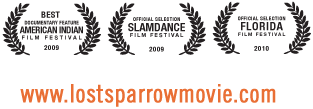On November 16, 2010 , the documentary “Lost Sparrow” premiered on PBS Independent Lens. Based on a true incident in 1978, two Crow Indian brothers (both adoptees) ran away from home and were found dead on railroad tracks the next day.
 The filmmaker is one of four biological children. His parents adopted six, with four of them from the Crow tribe. Billing was 16 when the boys died. The family buries them in
The filmmaker is one of four biological children. His parents adopted six, with four of them from the Crow tribe. Billing was 16 when the boys died. The family buries them in New York J ournalist-turned-filmmaker Chris Billing said it took three years to make the film. His parents, Mr. and Mrs. Billing, agree to see Lana on film but neither managed an appropriate response to her troubled past. Dysfunctional denial, which Mr. Billing’s exhibited while filming, seems inappropriate and not an apology, considering the facts revealed during the course of filming.
 |
| Four Native American children adopted by the Billing family |
Chris Billing’s film takes a closer look at what killed these two boys and what truth shattered his entire family.
 The filmmaker is one of four biological children. His parents adopted six, with four of them from the Crow tribe. Billing was 16 when the boys died. The family buries them in
The filmmaker is one of four biological children. His parents adopted six, with four of them from the Crow tribe. Billing was 16 when the boys died. The family buries them in
The filmmaker narrates how his little brothers Bobby (13) and Tyler (11) were trying to help their sister Lana (who is also Crow). Lana told her brothers she was being sexually molested by their adoptive father. The two boys were going to Montana
As the film unfolds, Billings North Carolina Billings New J ersey New York
The man at the center of the conflict, the adoptive father, an all-controlling philanderer, rich businessman, acts like nothing happened, like he did nothing wrong. What you hope is he was charged as a pedophile and sent to prison. This didn’t happen.
What does happen is the filmmaker and his siblings repatriate the two boys to the Crow tribe and have them interned on tribal land. Chris films the boys’ father and tribal family who knew the boys were adopted by a rich East coast family but could do nothing to stop the adoption. Their grief leaves the viewer tormented.
After revealing the entire truth, the filmmaker said it did little to bond their family or cure old wounds, “If it was good for Lana, then making the film was worth it.”
Wounds this egregious and deep are not healed by a 78-minute film.
From the Lost Sparrow PR:
On June 27, 1978, a 44-car Conrail freight train struck and killed two Crow Indian brothers near the town of Little Falls, New York -- a day after Bobby, 13, and Tyler, 11, had disappeared. The two boys had run away without warning from the white, Baptist family that had adopted them and their biological sisters seven years earlier, spiriting them from a troubled Montana reservation family to an idyllic Victorian castle across the country. Lost Sparrow recounts award-winning filmmaker Chris Billing's investigation, three decades later, into the dark family secret that prompted his adopted brothers to flee.
From the Lost Sparrow PR:
On June 27, 1978, a 44-car Conrail freight train struck and killed two Crow Indian brothers near the town of Little Falls, New York -- a day after Bobby, 13, and Tyler, 11, had disappeared. The two boys had run away without warning from the white, Baptist family that had adopted them and their biological sisters seven years earlier, spiriting them from a troubled Montana reservation family to an idyllic Victorian castle across the country. Lost Sparrow recounts award-winning filmmaker Chris Billing's investigation, three decades later, into the dark family secret that prompted his adopted brothers to flee.







No comments:
Post a Comment
Please leave a comment.